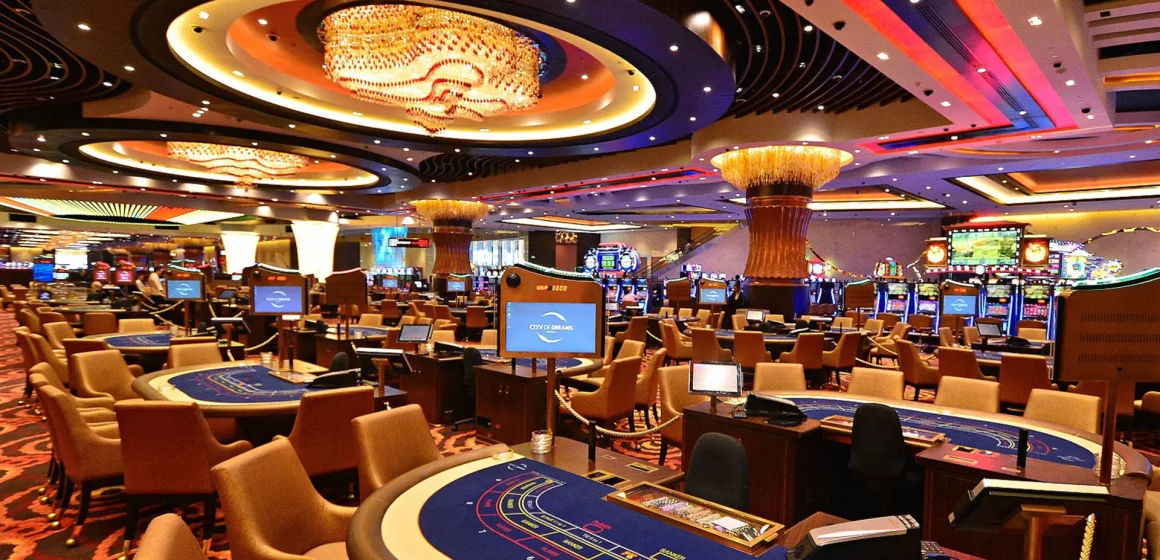A casino is a place where people can gamble and play games of chance. It is also home to many restaurants, bars and shops. Some casinos even have theaters and museums.
Gambling, however, only accounts for a small part of the profits that casinos make. The rest comes from musical shows, lighted fountains and other forms of entertainment.
Origin
The word casino is derived from the Italian word for little house. Its early use was to refer to small clubhouses for gambling and games. In modern times, casinos have grown into complexes that include hotels and restaurants. These complexes also offer sports and entertainment events.
The first official casino was opened in 1638 by the city of Venice. It was called the Ridotto and was designed to amuse the crowds during the Venetian Carnival. It was a highly exclusive gambling house, and only nobles were allowed to play there. The games were primitive, and the bets were high. The city of Venice gained a substantial income from the casino’s operations.
After the 17th century, more and more gaming houses appeared across continental Europe. They were not as lavish as the ones in Monte Carlo, but they were a significant source of income for their owners. Today, many casinos are located in cities such as Las Vegas, which is one of the most popular gambling destinations in the world. Others are found in remote areas and can only be accessed by a shuttle boat or on foot.
Functions
Casinos provide a variety of entertainment and relaxation functions. In addition to gambling, they offer food and beverage services, and often feature live entertainment. They also serve as venues for weddings and other special events. They also promote health and fitness activities, and encourage responsible gaming. The casino industry is experiencing significant changes, especially in the twenty-first century. As a result, 우리카지노 are becoming choosier about who they accept as patrons. They focus their investments on high rollers, who make large bets and spend much more than the average person. High rollers receive lavish inducements, including free spectacular entertainment and luxury suites.
The primary function of a casino is to maintain an enjoyable, safe and fun environment. In order to do so, casino dealers must adhere to company policies and federal and state regulations. They must also be able to perform all functional and technical duties, such as enticing players to play and attending to their needs politely.
Games offered
A casino offers a wide variety of games. These include card games, dice games, domino games, roulette, and slot machines. Some of these games are banked, which means that the house has a stake in the outcome of the game and bets against players. Others are nonbanked, which means that the payout and house’s cut depend on the amount wagered.
If you are a casino player, you should avoid swearing and using strong language in front of other people. This is considered rude and can make other players uncomfortable. Also, avoid offering unsolicited advice to other players. Just like Larry at the gym, casino goers are tired of hearing your unsolicited opinions and advice. They would rather hear it from someone they know or trust.
Security measures
Casinos are often a target for theft and fraud, especially since they deal in large sums of money. They must therefore have stringent security measures in place to safeguard their assets and patrons. These include using access control systems that use various authentication methods to grant or deny access to different areas. This way, casinos can keep track of who entered what area and at what time, which can help them identify potential issues and take appropriate action.
In addition, many casinos have vault rooms that store their cash reserves. These are secured with vault doors and silent alarms that alert law enforcement immediately, thus preventing any potential robbery. Casinos also have security staff that monitor the gaming floors and use CCTV to prevent cheating and suspicious activity.
Casinos must also prioritize cyber security and conduct regular audits to ensure that their data is secure. They may hire in-house cybersecurity directors to handle this element of their security system. This is important because hackers target casinos and gambling sites, and the resulting malware can spread to other devices.
Taxes
In addition to supporting local jobs and boosting property values, casinos also bring in a substantial amount of tax revenue. This revenue can be used for a variety of purposes, including police and fire department programs; neighborhood economic development; community education; and citywide recreational and cultural activities.
Casinos are often the subject of debate about their taxes, but they provide a significant boost to many local economies around the world. They can generate substantial tax revenues that can be used to fund essential services and to avoid budget cuts in other areas. These taxes can also be used to pay for new projects and infrastructure improvements in the local area.
The rates that casinos must pay are determined by different countries, but they all depend on a percentage of gross gaming revenue (GGR). While this might seem unfair for gamblers, it is necessary for governments to recoup some of the money that casinos spend on their operations. It is important that these taxes are not too high or they will discourage gambling. Many countries are tinkering with their casino taxes to find the right balance between profitability and public benefit.



Leave a Reply